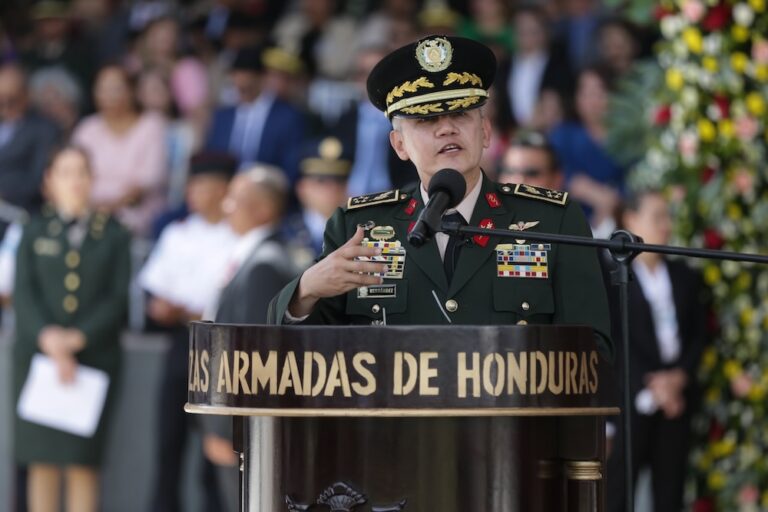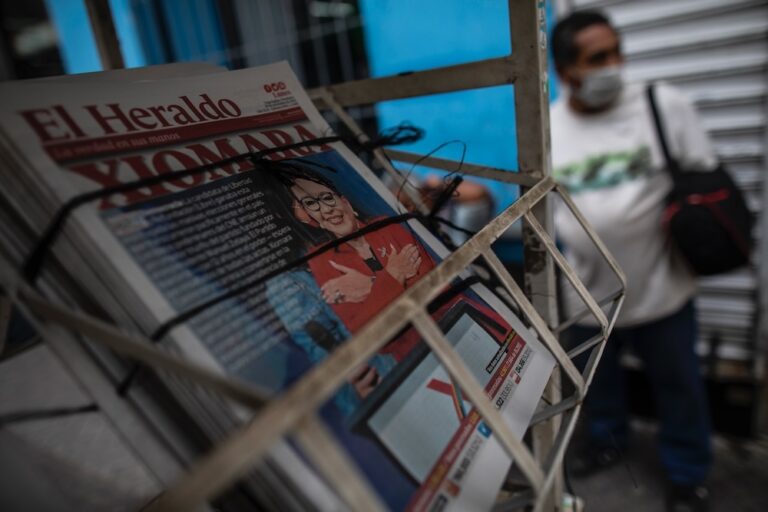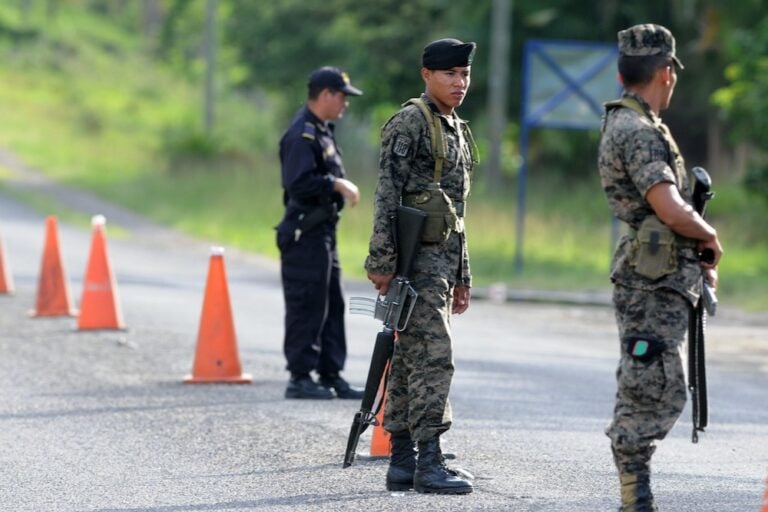PEN Honduras member Cesario Alejandro Félix Padilla Figueroa is facing immediate detention after a warrant was issued for his arrest and that of five other students at the National Autonomous University of Honduras.
This statement was originally published on pen-international.org on 22 June 2016.
PEN Honduras member Cesario Alejandro Félix Padilla Figueroa is facing immediate detention after a warrant was issued on 7 June 2016 for his arrest and that of five other students at the National Autonomous University of Honduras in the Honduran capital Tegucigalpa. All six have been charged with ‘usurpation’ of university property after allegedly taking part in student protests. If convicted, they could be sentenced to up to five years in prison.
Padilla and some of the other students have reportedly also been subject to unlawful surveillance and harassment by criminal investigators in recent months. He and others have suffered reprisals since 2014 in connection to their part in ongoing student demonstrations against the privatisation of the UNAH and calling for greater access to state education and student participation in governance of the university.
PEN International believes that Padilla and his fellow students are being prosecuted for the exercise of their rights to freedom of expression and assembly, enshrined in the Honduran Constitution (Articles 72-75and 79), as well as in the American Convention on Human Rights (Articles 13 and 15) and the International Covenant on Civil and Political Rights (Articles 19 and 21) to which Honduras is a state party. PEN urges the Honduran authorities to refrain from criminalising social protest and to drop the charges against Padilla.
TAKE ACTION:
Please send Appeals:
– Urging the Honduran authorities to drop all changes against PEN Honduras member Cesario Alejandro Félix Padilla Figueroa, whom PEN International believes is being prosecuted for exercising his right to freedom of expression and assembly by peacefully participating in and observing student protests;
– Calling on them to protect Padilla and to investigate any unlawful surveillance of him;
– Calling on them not to criminalise social protest or use the justice system to generate fear, censorship and silence among journalists, writers and others in Honduras.
Addresses:
Public Prosecutor
Abogado Fernando Chinchilla Banegas
Ministerio Público
Lomas del Guijarro
Avenida República Dominicana
Edificio Lomas Plaza II
Tegucigalpa
Honduras
Email: mprelacionespublicas@gmail.com ; multilateralddhh@gmail.com
National Human Rights Ombudsman
Dr. Roberto Herrera Caceres
Comisionado Nacional de los Derechos Humanos (CONADEH)
Colonia Florencia Norte
Boulevar Suyapa
Tegucigalpa Honduras
Email: despacho@conadeh.hn ; herreracaceres@conadeh.hn
Twitter:
#Honduras: End harassment of @penhonduras member, Cesario Padilla, on trial for student protests {insert RAN link}
SOLIDARITY
Messages of solidarity can be sent to Cesario Padilla via Tamsin Mitchell tamsin.mitchell@pen-international.org
It is recommended that you send a copy of your appeals via your nearest Honduran embassy .
**Please contact the PEN International office in London if sending appeals after 31 July 2016**
Please keep us informed of any action you take in regard to Cesario Padilla’s case, including any responses you receive from the authorities.
Background
Cesario Alejandro Félix Padilla Figueroa is facing immediate detention after a warrant was issued on 7 June 2016 for his arrest and that of five other students at the National Autonomous University of Honduras (UNAH) in Tegucigalpa. All six have been charged with ‘usurpation’ of university property after allegedly taking part in student protests. The crime carries a prison term of three to five years under Article 231 of the Honduran Penal Code.
The Public Prosecutor’s Office has accused Padilla, Moisés David Cáceres, Sergio Luis Ulloa, Josué Armando Velásquez, Dayanara Elizabeth Castillo and Izhar Asael Alonzo Matamoros of occupying UNAH buildings for 48 hours and acts of vandalism against university property during a fresh outbreak of student protests that began in early June. According to reports, the charges were brought at the request of the rector of the UNAH, Julieta Castellanos, who believes that the accused students are responsible for orchestrating the occupation.
However, Padilla was reportedly the only one of the six accused who was actually present in the UNAH at the time of the occupation. According to reports, Padilla did not take part in the occupation but was there to observe the policing of the protest in his capacity as a journalist and human rights defender. The other five students were not present. Indeed, Castillo has been living in Costa Rica for more than a year (see below).
Padilla, Cáceres, Ulloa and Velásquez reportedly face immediate detention since a similar case brought against them last year is still pending trial. On 17 July 2015 they were charged with ‘usurpation’ of UNAH property for taking part in the occupation of a building during previous protests. The charges were upheld at an initial hearing on 5 August 2015 and, according to PEN Honduras, the case is pending trial at the Criminal Court.
Because the four are already subject to non-custodial measures imposed as an alternative to preventative detention – including a ban on leaving the country and weekly reporting to the court – such measures are not an option in this new case, says PEN Honduras.
Padilla and Cáceres have been subject to unlawful surveillance by agents from the Technical Agency for Criminal Investigations (ATIC), according to a complaint made by defence lawyers for the students in the most recent case. The complaint to the Public Prosecutor’s Office, filed on 10 June 2016, also states that ATIC agents have been attempting to prevent Padilla, Cáceres, Velásquez and Ulloa from entering the university campus, among other irregularities. This is an abuse of authority, says the complaint, since the students are not accused of a crime that permits such surveillance.
Padilla was also subject to surveillance last year, in the weeks after the original court case was brought against him. On 15 August 2015, he reported that in the previous few days he had been followed by two unknown armed men in his neighbourhood who had also been keeping watch over his home. The men had made it known to Padilla that they intended to harm him. He and PEN Honduras believe that this surveillance was in retaliation for his activities as a student leader and feared for his safety.
In December 2014, Padilla and five UNAH other students, including Cáceres, Castillo and Ulloa, were arbitrarily suspended from the university after taking part in similar protests. They were subsequently re-admitted to the UNAH after a ruling by the Honduran Supreme Court of Justice in February 2015. However, Castillo left Honduras to study in Costa Rica after her suspension and related harassment. She reports receiving an anonymous telephone threat on 14 June warning her of repercussions should she return to Honduras.
Dina Meza and Kenia Oliva, respectively President and legal officer of PEN Honduras, have requested various national bodies to provide protection for Padilla and the other students who were suspended, without success. These bodies include the Protection and Social Conflict Analysis Mechanisms of the Office of the Secretary for Human Rights, Justice, Governance and Decentralisation; the Public Prosecutor’s Special Prosecutor for Human Rights; and the human rights ombudsman (National Commissioner for Human Rights or CONADEH). According to Meza, none of these bodies have responded to their petitions, sent between January and July 2015.
On 13 June 2015, Meza and Oliva asked the Inter-American Commission on Human Rights (IACHR) to intervene in the case of Padilla and the other suspended students. The ‘precautionary measures’ requested would oblige the Honduran state to protect the students’ right to freedom of expression, association and education and to ensure a thorough investigation into alleged abuse of authority and human rights abuses within the UNAH. The case is pending decision by the IACHR.
PEN International believes that Padilla and the other students charged with ‘usurpation’ are being prosecuted for the exercise of their right to freedom of expression and assembly by peacefully participating in and observing student protests. It calls on the Honduran authorities not to criminalise social protest and to drop the charges against Padilla and his fellow students. It also calls on Rector Julieta Castellanos to engage the students of the UNAH in meaningful dialogue in order to listen to and address their concerns without recourse to criminal prosecution.


